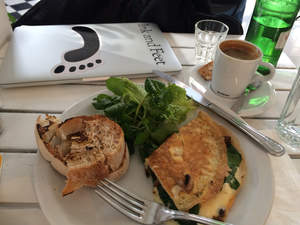
 Ink and Feet
Ink and Feet 

Instead of a narrative letter this week, I thought I'd give you a bunch of small snapshots of Mendoza - little glimpses that make up the bigger whole of life here, mid-winter.
I hope you enjoy. :)
The Politeness. Mendozans are consummately polite. I've never seen anyone here even mildly ruffled, or less than tremendously courteous to the people around them. Restaurants, along the streets, battle-rapping in the parks late at night. There's respect everywhere.
The Reserve. Before I arrived, I asked my friends how things were here. They're a cold-weather people, one of them replied. And it's true. There's a distance here, a private that accompanies every interaction. For me, it's a welcome relief - as an introvert, I thrive on alone time and space to think. Everywhere I go, between everyone I meet, there's just a bit more distance.
The Hand-Made Trash Receptacles. This is honestly my favorite idiosyncrasy of Mendoza. Along every street, there are raised metal cages to drop your garbage in. Pickup is twice a day - once at siesta, and once at 9pm. Ok. Lots of places have weird trash systems. But here's the thing - every one of those trash cages is different. Every one. It took me weeks to dig up the story of why, but I finally got it.
Mendoza as a city knows how important wine tourism is to its economy, and especially with the financial crisis here a few years back, they wanted to make sure the city remained a destination. Because of that, making a great first impression with a clean city was a priority. Thus the cans and the super-frequent pickup. But instead of standardizing, the way it works here is that each homeowner hires one of a number of trash-cage artisans to make the trash cage they're looking for. Some are pure utility. Some are elegant. But all of them, on every single block of a 100,000 person city, are different.
The Canals. Mendoza is in the middle of a desert, and as soon as you arrive in town, you're immediately aware of that. Deep canals run next to every street, feeding the little rainfall to farms, parks, and vineyard after vineyard. Tall trees run up beside them, soaking in anything that slips through.
The Dogs. Real dogs, off-leash with their people, everywhere. Running around the parks. Going for walks downtown. These weren't tiny purse-dogs, nor street dogs running loose. They were dog dogs. Full-size, full of personality, bonded with their owners, and in typical Argentinian style, impeccably behaved. Each day I was out walking in the park, I was reminded of the kinship we've shared with dogs for thousands of years.
The Tango. Not only my experience of learning to tango, but the the experience of taking in a tango exhibition, one late night. I watched couples moving in ways I didn't think possible, full of grace, power, and beauty. I don't know any other way to say it other than tango feels like Argentinian dance. Reserved, direct, elegant, with passion bubbling, right under the surface.
The Schedule. Your day here goes like this: Wake up around 9, get into work by 10. Close the shop from 1-5pm, and take a nap, go for a run, do your thing. Then work a bit more. Dinner is never ever earlier than 9pm, and most restaurants don't close until the wee hours of the morning. Going out to a club? Things really start up around 2am, and keep going until sunrise.
The Futbol - While I was here, the Copa América football tournament took place. All of the countries in the Americas play in it, and Argentina entered as a heavy favorite. Before each match, I'd make my way down to a local bar, find a table, order a drink, and take it all in. I've watched soccer in Colombia. Mendoza was nothing like that. Colombia is a passionate fervor, bordering on complete insanity. Argentina was reserved. When the games started, the bar fell silent. Completely silent. The only breaks in the quiet were short punctuations of cheering and applause each time a goal was scored. Then thirty seconds later, silence again. When the games were finished (each Argentinian game I watched was a victory), there was a small cheer, and then people's conversations resumed. It was the exact opposite of what I expected.
The Giant Parks, Everywhere. Large plazas are typical of many Latin American cities, but here they have uniquely Argentinan flavor. They're open, wide, well-groomed, and well-used. Late at night, near the statue of the conquering hero, you can find the hip-hop heads battle-rapping. But unlike the places I've been in Latin America, Mendoza compliments its plazas with vast, green-space parks. One a kilometer from my apartment stretches 3 km by 2km. Another runs ten kilometers along the length of a major freeway. Trees line every single street. Plants here, are a way of life.
The Hand-Lettered Signs That Cover Lujan de Cuyo. On a trip out into wine country, I noticed that one of the streets signs had an interesting thing happening with its font. Two street signs later, I realized what it was - every single sign in the entire city had been painted by hand. This support of artisans feels woven into the culture here in Mendoza. If you can make something beautiful and functional by hand, why ask a machine to do it?
The Wine. The wine here is astounding, drawn from the city itself, and all over the region. At several tastings at Wine Not, an amazing little store built from two people's passion, I learned more about wine than I had in my entire life. By the time I left, I could taste the difference between wines grown just 30 miles apart, and pick them out, blind. I understood what characteristics came from the grapes, and which from the soil. What oak tasted like, and the differences between them. I was hooked.
The Food. There are amazing, locally-grown olives everywhere. There's fresh-baked, wonderful bread everywhere. There is fantastic cheese of every variety, everywhere. And if you're thinking, Hey... wine, cheese, olives, bread... You're right.
The Italian Food. Mendoza is a city that feels like Spain and Italy had a child off in the Americas. Which, technically, they did. At the turn of the 20th century, a wave of Italian immigrants came to Mendoza. Land was cheap, and a lot of them had wanted to start their own wineries in Italy but couldn't afford to do it. Mendoza provided a spot, and the wine industry here was born.
The Made in Argentina Mentality. I've barely found anything here that's imported from outside country. Not the food, not the furniture, not the fashion. Even the super glue here, Golpo, is domestic. There's not a big deal made out of it, no big "Made in Argentina" campaigns to blast patriotism. It's just how they do things here.
The Memories. I came here at the coldest, darkest time of the year, and found wonderful people, amazing experiences, and a city that I grew to love. There were frigid walks under the southern cross, thermal springs steaming up a canyon, and dozens of places I ducked in to spend an afternoon. One of these years, I'll bet you, I'll come back.
But this weekend, I'm getting on a plane to one of my very favorite places on the planet, and diving into something extraordinary - and maybe the biggest risk of my life.
Tune in next week to find out where. :)
-Steven
p.s. The best thing I saw all week was this piece and set of photos that answer a great question: What happens after you put your phone in that e-waste recycling bin?
